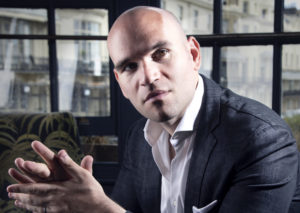
Opera in the Time of COVID: Michael Fabiano, Superstar Tenor & Co-Founder of ArtSmart
By David Salazar(Credit: Frances Marshall)
“Opera in the Time of COVID” is an interview series in collaboration with photographer Frances Marshall of Marshall Light Studio. We talk to notable figures from around the opera world to get their perspective on how they feel these challenging times may change opera’s present and future.
Few artists are as direct as tenor Michael Fabiano. The New Jersey native is not only a musical force on stage, but engaged in conversation, he is articulate and frank, whether he is talking about opera, his work with ArtSmart, or his view on the world at large.
In this interview, Fabiano expounds on how he believes the opera world can learn from the current crisis and why he thinks that streaming not only is, but must be, a bigger source of revenue for industry participants.
OperaWire: One of the major developments of this time are the emergence of streaming and connecting with fans and followers more directly via social media. How has this impacted your time in quarantine?
Michael Fabiano: In the time of COVID, for me there hasn’t been a big shift in how I consume information for the media.
The only thing that has happened is that many artists are using streaming platforms and live platforms far more often. If anything we all need to invest in better sound equipment.
OW: How can opera companies and artists around the world learn from the preponderance of streaming services moving forward and should it become a bigger part of the industry at large?
MF: I think there are opportunities for the opera world. As the world has changed it’s time to have open discussions with all company members about how to integrate live streaming performances from the stage to homes for revenue not for free.
In this time I understand the need to show that the lyric arts are still alive and fresh. But after all the arts are a commodity just like many other verticals namely finance, law, and medicine. When we soon enter phase one and phase two it will no longer be appropriate to constantly offer arts for free to the public just as it wouldn’t be appropriate to offer legal counsel or financial counselor to the public.
Moreover, my goal is to identify all of the new constituents who have been participating in arts consumption during COVID namely younger people and create an experience for them in the theater. Multi-media streaming platforms cannot and should not be a final new pathway for the arts as the arts must be consumed live and from a large space. Arts leaders must give inspiration and hope to the public now. I have faith that we will be back in our theaters very soon.
OW: What are you most excited about doing once the quarantine officially comes to an end and we are allowed to resume a “normal” life?
MF: Aside from singing on stage I have had a normal life in quarantine. I run every day, I drive my car every day, I still fly nearly every day, I study every day, I continue to run my foundation and my business, and I continue to be involved in current affairs.
OW: Who have been the people you have relied on most to help you through these challenging times?
MF: My lawyer Liz, my publicist Mindi, my manager Gianluca, my teacher Neil, and my mother.
OW: What activities do you miss the most?
MF: I miss going to the gym.
OW: Most people in quarantine are actively engaging with the arts via either music, TV, film, reading, literature. Etc. What have you been watching or reading during this time?
MF: Schitt’s Creek.
OW: Speaking more globally about the pandemic, what can the world learn about this experience? What do hope to see from our leaders (political or even industry) in order to build a better future that enables us to better manage any similar type of situation?
MF: It’s important for every member of the arts community always have alternative pathways in life.
When it comes to politicians, contingency plans for large nations must be ready to execute and equally keep the economic system churning.
When it comes to arts leaders, cross disciplinary activities and experiential entertainment to create multiple forms of revenue must be on offer and in strategic planning.
Categories
Interviews

